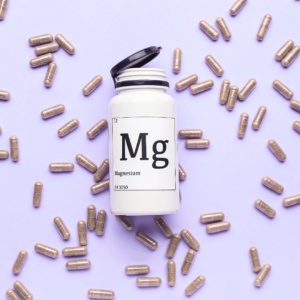Ah, Shark Week. Also known as the time of the month when Aunt Flo comes to visit, the Red Sea parts, and the Crimson Wave crashes in. Whatever euphemism you prefer, there’s no denying that menstruation has been the source of countless myths, misconceptions, and yes, even a few laughs.
We’re taking a deep dive into the menstrual myths to separate fact from fiction. And don’t worry, we’ll also introduce you to the Basal Body Ring, which can provide you with accuracy and help you navigate the waters of your menstrual cycle with ease.
Little known fact – the counter-pressure of water when you’re swimming can temporarily slow the flow of your period coming out of your body. It will return to normal as soon as you’re out of the water and standing upright again.
Little known fact – the word menstruation comes from a combination of Latin and Greek words meaning “moon” and “month” and some suggest that your menstrual cycle is influenced by the moon phases. A recent study suggests that there is no connection.
Little known fact – The blood that comes out of your body (including your uterus) is sterile and contains proteins unique to menstrual blood.
So there’s the 411 on some of the most common menstrual myths. While these myths might persist, it’s crucial to separate fact from fiction. And if you’re looking for a way to understand your menstrual cycle better and debunk these myths once and for all, consider using the Basal Body Ring. It’s not just a ring; it’s your companion in the journey of understanding your body and embracing your period with confidence. The BBRing provides accurate data based on your cycle – because no two menstrual cycles are the same! With personalised insights, you’ll be able to make informed choices regarding your health.
Check it out now!
We’re taking a deep dive into the menstrual myths to separate fact from fiction. And don’t worry, we’ll also introduce you to the Basal Body Ring, which can provide you with accuracy and help you navigate the waters of your menstrual cycle with ease.
Myth 1: Swimming on Your Period Attracts Sharks
Let’s start with the big one, shall we? The idea that sharks can detect the scent of menstrual blood from miles away and will happily swim straight towards you is as fictional as Jaws. Shark attacks are exceedingly rare, and the scent of menstrual blood won’t turn you into a shark’s snack. So, go ahead and enjoy the beach on your period. If anything, it’s a perfect time for some extra self-care.Little known fact – the counter-pressure of water when you’re swimming can temporarily slow the flow of your period coming out of your body. It will return to normal as soon as you’re out of the water and standing upright again.
Myth 2: You Can Sync Periods with Your Friends
Ever noticed that your period seems to sync up with your besties’ cycles? It’s called the “menstrual synchrony myth.” While it makes for great movie plots, there’s no scientific evidence to support this idea. Our cycles can vary due to multiple factors, making it more coincidental than anything else.Little known fact – the word menstruation comes from a combination of Latin and Greek words meaning “moon” and “month” and some suggest that your menstrual cycle is influenced by the moon phases. A recent study suggests that there is no connection.
Myth 3: Menstrual Blood Is Dirty
Menstrual blood is not “dirty” blood. It’s simply a mix of blood, tissue, and uterine lining. In fact, it’s one of the cleanest things to come out of your body, as it’s naturally shed tissue. The idea that you should avoid physical activities during your period because it’s “dirty” is a complete falsehood.Little known fact – The blood that comes out of your body (including your uterus) is sterile and contains proteins unique to menstrual blood.
Myth 4: Menstrual Cramps Are Just a Part of Life
While some cramping during your menstrual cycle is normal, excruciating pain is not. Severe menstrual cramps could be a sign of an underlying condition like endometriosis. It’s essential to consult with a healthcare provider to rule out any issues. And here’s where the Basal Body Ring comes into play. By tracking your menstrual cycle and logging your symptoms throughout your cycle, it can help identify patterns and outliers and provide data to discuss with your healthcare provider.Myth 5: You Can’t Exercise on Your Period
Honestly though, how many times have we used being on your period as an excuse not to exercise? Exercise is not only possible during your period, but it can also be beneficial. Exercise can help alleviate menstrual cramps, improve mood, and reduce bloating. It’s all about finding the right workout routine that suits your body during this time of the month. One study found that during the first 14 days of your cycle when your estrogen levels are low, you may see greater gains in strength and power.Myth 6: PMS Is Just About Mood Swings
While mood swings are indeed a part of premenstrual syndrome (PMS), it’s a multi-faceted experience. PMS can include a range of symptoms like bloating, breast tenderness, food cravings, and yes, mood swings. Tracking these symptoms with the Basal Body Ring can provide valuable insights into your cycle and help manage PMS effectively.Myth 7: You Can’t Have Sex on Your Period
This myth is more about personal preference than anything else. If you and your partner are comfortable with it, there’s no reason why you can’t enjoy sexual activity during your period. You do you boo! Little known fact – Sex on your period can help relieve menstrual cramps and boost mood thanks to endorphins and oxytocin released.So there’s the 411 on some of the most common menstrual myths. While these myths might persist, it’s crucial to separate fact from fiction. And if you’re looking for a way to understand your menstrual cycle better and debunk these myths once and for all, consider using the Basal Body Ring. It’s not just a ring; it’s your companion in the journey of understanding your body and embracing your period with confidence. The BBRing provides accurate data based on your cycle – because no two menstrual cycles are the same! With personalised insights, you’ll be able to make informed choices regarding your health.
Check it out now!





